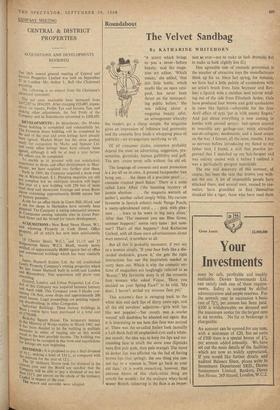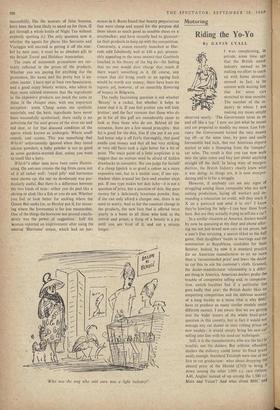The Velvet Sandbag
By KATHARINE WHITEHORN Of all consumer trades, cosmetics probably depend the most on advertising, suggestion, pre- sentation, gimmicks, human gullibility and gulf. The new cream never sells without the old oil.
The language of cosmetic and scent promotion is a joy all on its own. A pressed facepowder 'can bring you . . . the sheen of a precious pearl . . . contains crushed pearl flakes.' There is a scent called Love Affair ('the haunting mystery of jasmin absolute . . . the magnetic warmth of amber'), another called simply Whip. My current, favourite (a lipstick colour) reads Tango Peach, a many-splendoured coral . . . pink with plea.. sure . . . born to be worn in big juicy slices.' After that 'The moment you use Blue Grass, summer happens!' seems very tame : just sum- mer? That's all that happens? And Katherine Corbett, with all those stern advertisements about wart removal, is.nowhere at all.
But all this is probably necessary; if you szty to a woman simply, 'If your face feels like a dis- carded snakeskin, grease it,' she gets the right instructions but not the inspiration needed to carry them out. Which is why the cosmetic sec- tions of magazines are laughingly referred to as `Beauty.' My favourite story is of the cosmetic firm woman who asked Vogue, 'Have you decided on your Spring Face?' to be told, 'My dear, I haven't settled my autumn face yet.'
This autumn's face is swinging back to the white skin and dark lips of thirty years ago, and all the old novelists' adjectives—`girls with lips like wet poppies'—'her mouth was a, scarlet wound' will doubtless be wheeled out again. But it is interesting to see how this face was arrived at There was the so-called Italian look (actually a Left-Bank fad) of emphasised eyes and a white- out mouth; the idea was to keep the lips and sur- rounding face in much the same tone (lipsticks were first pale pink, then pale orange). The move to darker lips was effected via the fad of having brown lips (last spring): the one thing you can- not say to a woman is, 'Now go back to your old face.' (It is worth remarking, however, that extreme forms of this chalk-white thing are strictly for models : for the ordinary whey-faced winter British, colouring in the face is as impor-
taut as ever—not to make us look dramatic but to make us look slightly less ill.)
One agreeable side of cosmetic promotion is the number of attractive toys the manufacturers think up for us. Since last spring, for instance, we have had a little palette of eyeshadows with an artist's brush from Jane. Seymour and Rev- lon; a lipstick with a stainless steel mirror wind- ing out of the side from Elizabeth Arden; Gala have produced four brown and gold eyeshadows in cases like lipstick—admirable for the Jane Avril effect of eyes 'put in with smutty fingers.' And just about everything is now coming in bottles with aerosol sprays : hair-sprays scented to resemble any garbage-can; misty attractive eau-de-colognes; deodorants; and a hand cream on the way. 1 foresee, all the same, trouble. I was so nervous before introducing my fiancd to my father (not, I found, a skill that practice im- proves) that I snatched up my hair-lacquer and was entirely coated with it before I realised it was a particularly pungent insecticide.
The one real discovery of this summer, of course, has been the tans that brown you with- out the sun. A lot of responsible people have attacked them, and several men, unused to cos- metics, have grumbled to find themselves streaked like a tiger; those who have used them successfully, like the wearers of false bosoms, have been the least likely to stand up for them. (I got through a whole bottle of Night Tan without anybody spotting it.) The only question now is whether the agents for places like Sorrento and Viareggio will succeed in getting it off the mar- ket by next year; it must be an absolute gift to the British Travel and Holidays Association.
The costs of mammoth promotions are cer- tainly reflected in the prices of the products. Whether you are paying for anything but the promotion, the name and the pretty box is an- other matter. I have met at least two beauticians, and a good many beauty writers, who admit in their more relaxed moments that the ingredients in the expensive products are much the same as those .in the cheaper ones; with one important exception: scent. Cheap scents use synthetic materials, and the basic ingredients have never been successfully synthetised; there really is no substitute for the anal grease of the civet cat and red deer, or for that diseased condition of the sperm whale known as ambergris. Where smell counts, cost counts. This was something that Which? unfortunately ignored when they tested talcum powders; a baby powder is not as good as sonic gardenia-scented dust, unless you want to smell like a baby.
Which?'s other tests have been more illumin- ating. On anti-sun creams the big firms came out of it all rather well: 'royal jelly' and hormones were shown up; the one on deodorants was par- ticularly useful. But there is a difference between the two kinds of tests: either you do peel like a shrimp or stink like a fish or you do not. Whether you feel or look better for sucking where the Queen Bee sucks (or, as Huxley put it, for moan- ing where the hormones) is far less measurable. One of the things the hormone test proved conclu- sively was the power of suggestion: half the women reported an improvement after using the control 'Hormone' cream, which had no hor-
mones in it. Boots found that beauty preparations that were cheap and sound for the purpose did them about as much good as sensible shoes on a streetwalker; and have recently had to glamour- ise their products to keep up with the competition. Conversely, a cream recently launched at Har- rods sold fabulously well at £40 a pot, presum- ably appealing to the same instinct that Goebbels touched in his theory of the big lie—the feeling that no one would dare charge that much if there wasn't something in it. Of course, any cream that did bring youth to an ageing face would be worth any money; there have been no reports yet, however, of an unearthly flowering of beauty in Belgravia.
The really fascinating question is not whether 'Beauty' is a racket, but whether it helps to know that it is. If you feel prettier you will look prettier; and the fact remains that those who do go in for all this guff are considerably easier to look at than those who do not. Behind all the nonsense, there are a few sound principles: that fat is good for the skin, that if you put it on you had better take it off fairly thoroughly, that good smells cost money and that all but very striking or very old faces look a sight better for a bit of paint. The main point of a little scepticism is to suggest that no woman need be afraid of hidden drawbacks in cosmetics. She can judge for herself if a cheap lipstick is as good a colour as a more expensive one, but in a nastier case; if one eye- shadow slides around her face and another stays put. If one type makes her skin itchy—it is not a question of price, but a question of skin. She pays money for a deliciously luxurious powder, fine; if she can only afford a cheaper one, there is no need to worry. And as for the constant change in the products, the new face that is offered twice yearly is a boon to all those who look in the mirror and groan; a thing of a beauty is a joy until you are tired of it, and not a minute longer.
'Who was the wag who said ours was a light industry?'











































 Previous page
Previous page